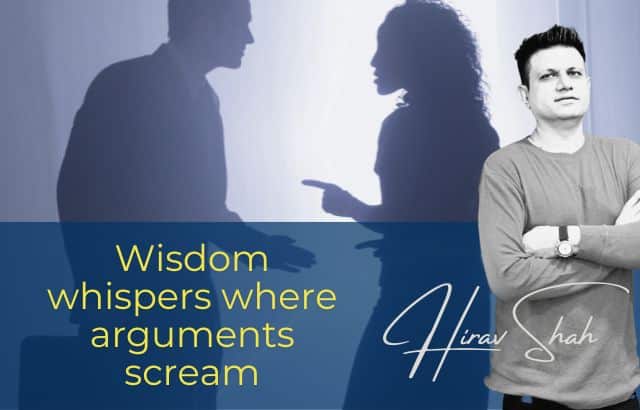In life, there are certain individuals whose arguments should never be taken lightly. Whether it’s the fool who lacks understanding, the crazy person who defies logic, the guru who possesses profound wisdom, or the parents who have nurtured and cared for you, each of these individuals possess a unique perspective that can challenge your own beliefs.
Table of Contents
Understanding the different types of people you should avoid arguing with
When it comes to arguments, not all individuals are worth engaging with. Understanding the different types of people you should avoid arguing with can save you energy, frustration, and unnecessary conflict. Let’s explore each type in more detail:
The Fool: Characteristics and why arguing with them is futile
- We’ve all come across fools in our lives.
- These individuals lack understanding and often make irrational statements or hold misguided beliefs.
- Engaging in a logical argument with a fool can be an exercise in futility as their ignorance may overshadow reason.
- Fools are often resistant to new information and unwilling to consider alternative viewpoints.
- Arguing with a fool can be like banging your head against a wall.
- No matter how well-reasoned your arguments may be, they are unlikely to change their perspective.
- Fools tend to be stubborn and unwilling to admit when they are wrong. Engaging in an argument with a fool can drain your energy and leave you feeling frustrated.
The Crazy: Identifying signs of irrational behavior and why engaging in arguments is unproductive
- The crazy person is characterized by their irrational behavior and beliefs.
- Engaging in an argument with someone who defies logic can be a recipe for frustration and confusion.
- The crazy person may hold beliefs that are completely detached from reality or exhibit erratic behavior that defies explanation.
- Identifying signs of irrational behavior can help you recognize when it’s best to avoid arguments.
- The crazy person may display a disregard for facts, engage in conspiracy theories, or exhibit extreme emotions that cloud their judgment.
- Engaging in a logical debate with a crazy person may only serve to fuel their irrationality and lead to a breakdown in communication.
The Guru: Exploring the dangers of arguing with self-proclaimed experts
- Gurus are individuals who claim to possess profound wisdom or expertise in a particular field.
- While engaging in a discussion with a knowledgeable person can be enlightening, it’s important to approach self-proclaimed experts with caution.
- Not all gurus are created equal, and some may use their perceived authority to manipulate or deceive others.
- Arguing with a guru can be dangerous as they may employ persuasive tactics to sway your opinion.
- Gurus often have a strong following and can be charismatic, making it easy to be swayed by their words.
- However, it’s essential to evaluate their claims critically and seek out multiple perspectives before accepting their wisdom as truth.
The Parents: Navigating the challenges of arguing with family members and the importance of maintaining healthy relationships
- Arguing with parents can be a sensitive matter.
- While they may not fall into the categories of fool, crazy, or guru, their role as caretakers and authority figures can make arguments with them emotionally charged.
- Parents have nurtured and cared for us throughout our lives, and their unconditional love often makes them the ultimate authority figures.
- However, disagreements with parents can arise due to generational gaps, differing values, or simply clashing personalities.
- Navigating these challenges requires patience, empathy, and the willingness to understand their perspective.
- Building and maintaining healthy relationships with parents involves open communication, active listening, and finding common ground.
The Fool: Characteristics and why arguing with them is futile
Knowing when to disengage from an argument is just as important as knowing which individuals to avoid arguing with. Here are some strategies for dealing with these individuals without getting caught up in unnecessary conflicts:
The importance of setting boundaries and knowing when to disengage
Setting boundaries is crucial when dealing with individuals who are argumentative or hold extreme beliefs. It’s essential to know your own limits and recognize when a discussion is no longer productive. Sometimes, the best course of action is to disengage and walk away from an argument that is unlikely to lead to a resolution.
By setting boundaries, you protect your mental and emotional well-being and prevent yourself from being dragged into endless debates that serve no purpose. It’s important to remember that not every argument is worth your time and energy.
Cultivating empathy and understanding to diffuse potential conflicts
- Empathy and understanding can go a long way in diffusing potential conflicts.
- By putting yourself in the other person’s shoes, you can gain insight into their perspective and find common ground.
- Instead of immediately dismissing their beliefs or opinions, try to understand the underlying motivations or experiences that shape their worldview.
- Approaching discussions with empathy and understanding can create a more conducive environment for productive dialogue.
- It can also help bridge the gap between different perspectives and foster a sense of mutual respect.
The Guru: Exploring the dangers of arguing with self-proclaimed experts
- Engaging in an argument with a fool can be futile as their ignorance may overshadow reason.
- Similarly, debating with a crazy person with irrational beliefs might lead to frustration and confusion.
- It is important to recognize the signs of irrational behavior and understand why engaging in arguments with such individuals is unproductive.
- One sign of irrational behavior is a complete disregard for facts and logic.
- These individuals often hold extreme and unfounded beliefs that are not based on evidence or reason.
- Engaging in an argument with them can be like trying to convince a brick wall to move.
- They are unwilling or unable to consider alternative perspectives or entertain rational arguments.
- Another sign of irrational behavior is an inability to control emotions.
- These individuals often react impulsively and irrationally to even the slightest disagreement or criticism.
- They may resort to personal attacks, name-calling, or manipulative tactics to deflect from the actual argument.
- Engaging with someone who is emotionally volatile can be draining and counterproductive.
- It is important to remember that arguing with a crazy person rarely leads to a resolution or mutual understanding.
- Their thought processes are often clouded by irrationality, making it difficult to have a productive conversation.
- Instead of engaging in arguments with them, it is often more effective to focus on maintaining your own emotional well-being and seeking out more rational and constructive discussions elsewhere.
The Parents: Navigating the challenges of arguing with family members and the importance of maintaining healthy relationships
- Engaging in a discussion with a guru can be enlightening as their wisdom and knowledge can broaden your horizons.
- However, it is important to approach such discussions with caution and discernment.
- Not all self-proclaimed experts are actually knowledgeable or credible, and blindly accepting their arguments can be dangerous.
- One danger of arguing with self-proclaimed experts is the potential for misinformation.
- Just because someone presents themselves as an expert does not mean they have the necessary qualifications or expertise to back up their claims.
- It is important to critically evaluate their arguments and do your own research to verify the accuracy of their statements.
- Another danger is the risk of falling into the trap of confirmation bias. When engaging with a guru, it is easy to be swayed by their charisma, confidence, and persuasive rhetoric.
- However, it is essential to maintain a critical mindset and not blindly accept everything they say.
- Seek out multiple perspectives and consider alternative viewpoints before forming your own conclusions.
- Additionally, arguing with a guru can sometimes lead to a power dynamic where their authority is unquestioned.
- This can inhibit independent thinking and discourage questioning or challenging their ideas.
- It is important to approach discussions with gurus as an opportunity for learning and growth, rather than blindly accepting everything they say without question.
- While engaging in discussions with gurus can be valuable, it is important to approach them with a healthy dose of skepticism and critical thinking.
- Remember that true knowledge is built on a foundation of evidence, logic, and open-mindedness.
- By critically evaluating arguments and seeking out multiple perspectives, you can avoid the dangers of blindly accepting the words of self-proclaimed experts.
Strategies for dealing with these individuals without engaging in arguments
- Arguing with parents can be a sensitive matter as their unconditional love and experience often make them the ultimate authority figures.
- However, it is important to recognize that disagreements can arise even within the closest of families.
- Navigating these challenges requires open communication, empathy, and the willingness to maintain healthy relationships.
- One of the main challenges of arguing with parents is the emotional attachment and history shared between family members.
- These emotional ties can make it difficult to separate the argument from personal feelings.
- It is important to approach these discussions with respect and understanding, keeping in mind that the goal is not to win or prove the other person wrong, but to find common ground and maintain a healthy relationship.
- Another challenge is the generational gap that often exists between parents and their children.
- Different life experiences and perspectives can lead to contrasting beliefs and values.
- It is important to recognize and respect these differences, even if they lead to disagreements.
- Instead of trying to change your parents’ beliefs or opinions, focus on finding areas of agreement or compromise.
- Maintaining healthy relationships with parents requires effective communication.
- This includes active listening, expressing your thoughts and feelings without being confrontational, and seeking to understand their perspective.
- It is important to approach discussions with empathy, recognizing that your parents’ intentions may be rooted in love and concern for your well-being.
- It is also important to set boundaries when arguing with parents. While disagreements are natural, it is essential to establish what is acceptable behavior and what is not.
- This can help prevent arguments from escalating into harmful or destructive patterns.
- Boundaries can be as simple as agreeing to take a break from a heated discussion and reconvene when emotions have cooled down.
- Remember, arguing with parents should not be about winning or proving them wrong.
- Instead, it should be about fostering understanding, strengthening relationships, and finding common ground.
- Maintaining respect, empathy, and open communication can help navigate the challenges of arguing with family members and ensure that relationships remain healthy and strong.
The importance of setting boundaries and knowing when to disengage
- When faced with individuals like the fool, crazy person, guru, or parents, it is important to have strategies in place to deal with them without engaging in arguments.
- These strategies can help diffuse potential conflicts and maintain your own emotional well-being.
- One strategy is to practice active listening. Instead of immediately responding to their arguments or claims, take the time to truly understand their perspective.
- Reflect back what they have said to ensure you have correctly understood their point of view.
- This shows that you are willing to listen and can help create a more constructive dialogue.
- Another strategy is to ask open-ended questions.
- This encourages the other person to elaborate on their thoughts and feelings, which can lead to a deeper understanding of their perspective.
- Open-ended questions also help shift the focus from confrontation to a more collaborative and exploratory conversation.
- Cultivating empathy is another effective strategy. Try to put yourself in the other person’s shoes and understand where they are coming from.
- This can help defuse potential conflicts and create a more compassionate and understanding environment.
- Empathy allows you to see beyond the surface-level arguments and connect on a deeper level.
- Knowing when to disengage is crucial. Sometimes, despite your best efforts, arguments may become heated or unproductive.
- In such situations, it is important to recognize when it is best to disengage and take a break.
- This can prevent further escalation and allow both parties to cool down before revisiting the discussion.
- Lastly, setting boundaries is essential. Clearly communicate your limits and expectations when engaging in discussions.
- This can include establishing rules for respectful communication, agreeing to take breaks when emotions run high, or even choosing to avoid certain topics altogether. Setting boundaries helps create a safe and respectful space for discussions.
Cultivating empathy and understanding to diffuse potential conflicts
- In conclusion, the saying “Never argue with four people: fool, crazy, guru, parents” holds valuable wisdom.
- Engaging in arguments with individuals who lack understanding, defy logic, possess profound wisdom, or are deeply connected to us can be challenging and unproductive.
- By understanding the dynamics of each individual, we can approach arguments more strategically and learn when it’s best to engage or simply walk away.
- When dealing with the fool and the crazy person, recognizing the signs of irrational behavior and understanding the limitations of arguing with them can help avoid frustration and wasted energy.
- Engaging in discussions with gurus can be enriching, but it is important to approach them with skepticism and critical thinking to avoid falling into the trap of misinformation or blind acceptance.
- Arguing with parents requires empathy, open communication, and the willingness to maintain healthy relationships, while setting boundaries to ensure respectful and constructive discussions.
- By implementing strategies such as active listening, asking open-ended questions, cultivating empathy, knowing when to disengage, and setting boundaries, we can navigate discussions with these individuals more effectively.
- Remember, it is not always about winning arguments, but about fostering understanding, maintaining relationships, and choosing your battles wisely.
Conclusion:
Engaging in an argument with a fool can be futile as their ignorance may overshadow reason. Similarly, debating with a crazy person with irrational beliefs might lead to frustration and confusion. On the flip side, engaging in a discussion with a guru can be enlightening as their wisdom and knowledge can broaden your horizons. Lastly, arguing with parents can be a sensitive matter as their unconditional love and experience often make them the ultimate authority figures.
By understanding the dynamics of each individual, we can approach arguments more strategically and learn when it’s best to engage or simply walk away. So next time you find yourself in a heated discussion, remember the saying: “Never argue with four people: fool, crazy, guru, parents”, and choose your battles wisely.

































